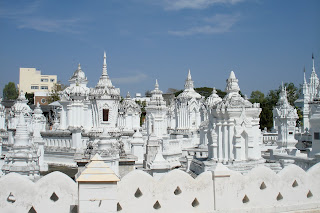Just some general observations, though.
One had bowls for coins to be distributed, like we saw at the big Reclining Buddha in Bangkok. There, we also saw offerings of food left at the Buddhas for the monks. Not all of the food was fresh; some was pre-packaged, and included not only food but other useful items – of particular note was a bottle of anti-acid, a nod to an aging monk population and the fact that Thai food can be tough on one’s digestion. During the rainy season, when it’s harder to get fresh food, more prepackaged food is donated. Anything in excess of the needs of the monastery goes to a food pantry for distribution to the poor.
We saw one place that had pre-packaged collections of infant items you could buy and donate, with things like formula, baby wipes, bottles, etc. in them. Presumably, that goes to the food pantry as well.
Singha Temple bears the same name as the local beer. It (the temple, not the beer) has been around for over 1,000 years, and the most significant Buddha statue is over 700 years old.
 The different faces of the Buddhas reflect the different things happening in society at the time they were created – angry for war, happy for some things, sad for others, etc.
The different faces of the Buddhas reflect the different things happening in society at the time they were created – angry for war, happy for some things, sad for others, etc.The last of these temples was also an of teak wood, and was about 400 years old. The murals in it are definitely showing deterioration, and we learned that there’s a big controversy as to whether it’s better to remove and duplicate, to try to rehabilitate what’s there, or to simply let it stay the way it is and allow nature to do as it will.
What it confirms, though, is the impermanence of man-made objects. Some of these things last hundreds of years, but eventually nature takes over and they all begin to fall down.

The Stupa in the center of this temple is large and white. It had a pully conveyance, so you could fill a little bucket with water and wheel it to the top where it automatically poured out to “cool” the Stupa. The problem with this, of course, is that water is the most destructive force on the planet, so by trying to cool the pagoda you were, in fact, contributing to it’s eventual demise.
 One comment about the monks - it's funny to see them in their robes but using a cell phone, or on the internet with their laptops. They have, however, embraced technology despite their teachings. You can even go into chat rooms and have "monk chat" with them to find out more about their lives. We saw these two college students outside one of the temples, and there were several others that were sitting around at tables and would happily talk with you, in part to explain their beliefs and in part to practice their English.
One comment about the monks - it's funny to see them in their robes but using a cell phone, or on the internet with their laptops. They have, however, embraced technology despite their teachings. You can even go into chat rooms and have "monk chat" with them to find out more about their lives. We saw these two college students outside one of the temples, and there were several others that were sitting around at tables and would happily talk with you, in part to explain their beliefs and in part to practice their English.



No comments:
Post a Comment